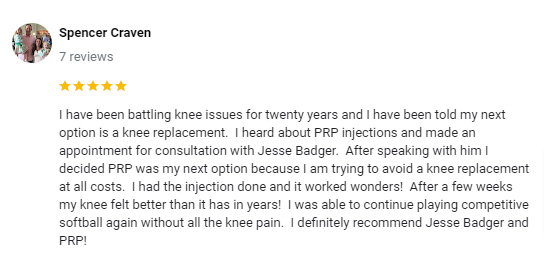PRP - Platelet Rich Plasma in Jacksonville FL

Platelet-rich plasma therapy in Jacksonville FL is a minimally invasive, non-surgical treatment that relieves pain by promoting long-lasting healing of musculoskeletal conditions by magnifying your body's own healing processes.
The body’s natural response to an injury is to send platelets from the blood to the damaged tissues which initiates the natural healing process.
Platelets store a vast array of growth factors which are released at the site of injury. Through a process called cell signaling, the platelets call for other healing factors to be drawn into the site of injury. PRP acts in much the same way, but with an extremely high dose of platelets specifically injected into the target area. This treatment enhances the body’s healing response for acute musculoskeletal injuries and chronic conditions like arthritis and tendonitis.
What is PRP in Jacksonville FL?
PRP consists of a highly concentrated solution of your own platelets, growth factors, signaling molecules and other plasma proteins. These play vital roles in orchestrating tissue healing and stabilization. To yield a therapeutic benefit, platelets must be concentrated at least 4 to 5 times for a dose of over 1 billion platelets per mL. The PRP used in our clinic contains a highly significant, industry-leading 7 to 12 fold increase in platelet concentration compared to whole blood. This concentration far exceeds the minimum requirement of 1 billion platelets per mL.
Benefits of PRP
- Minimally invasive, non-surgical procedure
- Enhanced healing with your own natural healing factors
- Extremely low incidence of side effects
- Minimal down time – Ability to carry on with your usual routine post injection
Numerous clinical studies have confirmed that PRP provides significant healing and long-lasting reduction in pain for a variety of injuries.
- Several recent studies and reviews have demonstrated PRP to be more effective than corticosteroids or hyaluronic acid, the current, standard treatments for knee osteoarthritis.
- A study in the American Journal of Sports Medicine revealed that patients with elbow tendinosis receiving PRP reported a 46% reduction in pain by week four, and an 81% reduction in pain after six months. At the study’s conclusion, 93% of patients were completely satisfied with their PRP treatment and had avoided Surgery.
- MRI imaging across numerous studies has also confirmed significant improvements in pain relief. Studies show that over 70% of patients receiving PRP for Knee Osteoarthritis have delayed further progression of the disease and prevented further knee degeneration. [6] PRP may in some cases eliminate the need for more aggressive treatments such as long term medication or surgery.
Body parts and conditions can be treated with PRP
Knee
- Osteoarthritis
- Meniscus tears
- Partial tears of the ACL & PCL or LCL & MCL
- Patellar tendinosis
Shoulder
- Osteoarthritis
- Partial rotator cuff tears
- Labral tears
- Bursitis
- Tendonitis and tendinosis
- Acromioclavicular joint dysfunction and pain
Foot & Ankle
- Osteoarthritis
- Ligament sprains and tears
- Plantar fasciitis
Elbow, Hand & Wrist
- Osteoarthritis
- Epicondylitis (tennis and golfer’s elbow)
- Tendonitis and tendinosis
Spine / Back
- Sacroiliac Joint Dysfunction
Hip
- Osteoarthritis
- Acute Hamstring Injuries
- Proximal Hamstring Tendinopathy
- Labral tear
- Trochanteric bursitis & Iliotibial band dysfunction
Frequently Asked Questions
How is PRP Treatment performed?
What can I expect during the procedure?
Is there any downtime after a PRP procedure?
When can I expect pain relief?
How many injections do I need?
Are the results permanent?
Are there any pre-procedural guidelines?
What are my post-procedural expectations?
Is all PRP the same?
Who should consider PRP?
Are there side effects?
Does the procedure hurt?
How well does the procedure work?
Will my body reject the PRP?
Can PRP therapy delay a knee replacement?
How much does a PRP treatment cost?
Does my insurance cover PRP therapy?




